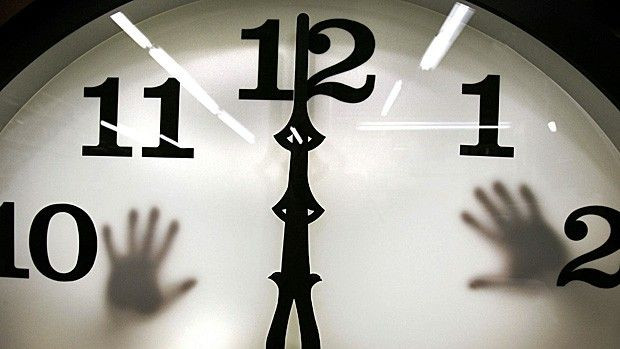Leap Second 2012: Earth Adds Extra Second Saturday Night [VIDEO]

Blink and you'll miss it. If the day seems a little longer than usual on Saturday, June 30, 2012, that's because a so-called leap second will be added to the world's atomic clocks at midnight as they undergo a rare adjustment to keep them in step with the slowing rotation of the Earth.
Saturday will be extended to 24 hours and 1 second to compensate for the fact that it's taking the planet longer and longer to complete a full rotation around its axis. The atomic clocks will read 23 hours, 59 minutes and 60 seconds before moving on to midnight Greenwich Mean Time.
Time is measured in two ways: solar time relative to the earth's rotation and atomic time based on measurements of the internal oscillations in atoms. However, over the years, these two relative times will get put off sync.
The solar day is gradually getting longer because the Earth's rotation is slowing down ever so slightly, explains Daniel MacMillan of the National Aeronautics and Space Administration (NASA).
Now, it takes the Earth about two milliseconds longer than it did 100 years ago to rotate on its axis -- which is the definition of a day. And in a year's time, this will add up to nearly three-quarters of a second.
If no adjustments were made, the clocks would move farther ahead, and after many years, the sun would set at midday. The atomic clock is the ultimate reference for all other clocks in the world, and it governs time standards for the Internet, satellite navigation, banking computer networks and international air traffic systems.
The International Earth Rotation and Reference Systems Service (IERS), based in Paris, is responsible for keeping track of the gap between the precise-atomic clock and the planetary time and deciding when to make additional leap seconds.
We want to have both times close together, and it's not possible to adjust the Earth's rotation, Daniel Gambis, head of the Earth Orientation Centre of the IERS, told Reuters.
Leap seconds were introduced in the early 1970s to occasionally correct for those variations between solar and atomic time. Like the leap day, this is an internationally agreed-upon event that happens either on Dec. 31 or June 30. This Saturday is the first leap second since January 2009 and the 25th overall. The next one probably won't be needed until 2015 or 2016.
So what will you do with a whole extra second today? A couple of thoughts:
- Sleep in. Take an extra stretch in bed.
- Take a deep breath.
- Say one Mississippi.
- Eat an extra potato chip.
- Give your loved one a quick peck on the cheek.
- Make sure to post a status update on Facebook at 23:59:60
The Debate
The leap second has long caused debate among member countries of the International Telecommunication Union (ITU), with some arguing for it to be eliminated in favor of the exclusive use of atomic time.
Opponents of the leap second want a simpler system that avoids the costs and margin for error in making manual changes to thousands of computer networks, Reuters reported. Supporters argue the practice of adding leap seconds needs to stay to preserve the precision of systems in such areas as navigation.
However, a meeting of the ITU failed to reach a consensus in January, and its members decided they needed more time to think about the issue. They will debate it again in 2015.
So for now, enjoy that extra second -- and don't waste it.
© Copyright IBTimes 2024. All rights reserved.






















